Glucose meters are devices used at home to monitor the concentration of glucose in the blood. For people who have type 1 or type 2 diabetes, a glucose meter is a necessity.
Glucose meters can alert you if your blood glucose is too high or too low, allowing you to intervene with glucose tablets, insulin, or other medication to prevent a hypo or hyperglycemia.
Below our health experts have brought together their picks for the best glucose meters of 2023.
Rankings
1. DSS Precision Xtra Blood Glucose Meter Kit
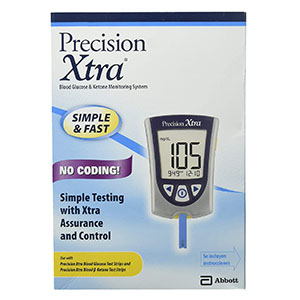
Click here for the lowest price on Amazon
The DSS Precision Xtra Blood Glucose Meter Kit provides everything you need (other than test strips) to obtain a fast, accurate blood glucose reading wherever you are. If you are looking for a dependable travel kit, this should serve you well.
Why we like it: The DSS Precision Kit comes with a meter, 10 lancets, lancing device, and a handsome carrying case. Batteries are included. The meter itself utilizes a state of the art algorithm that produces reliably accurate results time after time.
Flaws: The setup instructions could be a bit clearer.
2. GE100 Blood Glucose Monitoring System
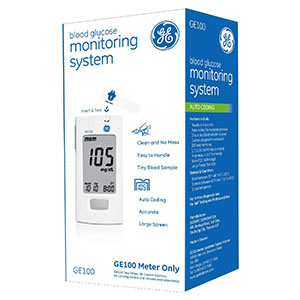
Click here for the lowest price on Amazon
GE produces some of the most advanced technology in the world, so it’s no surprise their GE100 Blood Glucose Monitoring System is both accurate and dependable. Easy to use with a nice big LDC screen, it’s especially useful for older folks whose eyesight is not what it used to be.
Why we like it: The GE100 requires only a minimal sample size and returns accurate readings in about 5 seconds. The advanced algorithm enables you to view average readings for up to 90 days. The meter also shuts down automatically to save the battery.
Flaws: No test strips included.
3. TrueMetrix Self Monitoring Blood Glucose Meter
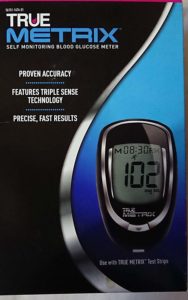
Click here for the lowest price on Amazon
TrueMetrix strikes a good balance between simplicity and desirable features, while maintaining great accuracy and a few perks that are hard to find in top of the line devices.
Why we like it: TrueMetrix has a broad range of features that make the process of monitoring blood glucose less of a pain: it supports testing from alternative test sites (like your palm, which is less sensitive than your fingertips), and its on-board memory can store up to 500 glucose readings, along with the date and time of the reading. Results are ready in just four seconds, and the display screen is large and easy to read—which makes it great for older adults.
Flaws: While the on-board device memory is impressive, there’s no way to wirelessly transfer that data elsewhere; you’ll have to copy it by hand if you want to log it electronically.
And while alternative test sites are great, they aren’t guaranteed to be as accurate as your fingertips. Of course, just because a glucose meter is capable of reading blood from other test sites doesn’t mean you have to—TrueMetrix works great at the fingertip, which might be the best plan for accurate readings in any case.
4. Prodigy AutoCode
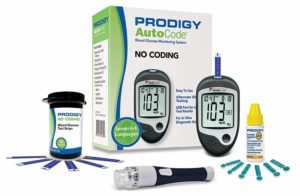
Click here for the lowest price on Amazon
As the name suggests, the Prodigy AutoCode makes testing easy and simple—no old-fashioned manual entry of test strips codes necessary. The Prodigy AutoCode is also excellent for users who want to store their data electronically, thanks to its ability to download data via USB.
Why we like it: Prodigy successfully threads the needle between keeping things simple and giving you access to all of your data. The on-board device memory stores up to 450 measurements, and if you want to keep these, you can use the included USB cable to transfer the raw data to your computer. On top of that, the AutoCode boasts good accuracy in third-party testing.
Flaws: Though the Prodigy AutoCode is great for storing and exporting data, the USB connection is a little old-hat. The lack of a wireless connection (e.g. bluetooth) is sorely missed: there’s no simple way to backup or review data when you are away from your computer. Aside from that, the accuracy is good and using test strips is simple, though.
5. OneTouch Ultra Mini
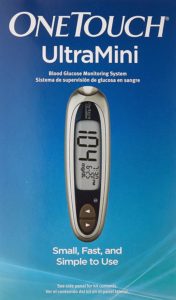
Click here for the lowest price on Amazon
If you want something that is super-portable and dead simple to use, OneTouch has a great product that will work well for you. The accuracy is quite good, too, making this a good option if you just want something that is simple and precise.
Why we like it: If you travel a lot and are sick of large, clunky glucose meters, the tiny size of the OneTouch Ultra Mini is hard to beat. There isn’t another glucose meter on the market that can match its accuracy and its small size at the same time.
Flaws: As you might expect, simplicity in a compact form factor does come with a few drawbacks in the way of features. Other products offer more options for logging and tracking your blood glucose levels over time, so if you want this suite of broader capabilities, another glucose meter might be a better fit.
6. Accu-Chek Aviva Plus
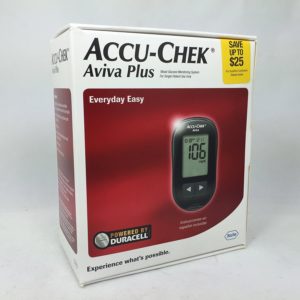
Click here for the lowest price on Amazon
When it comes to glucose meters that are plain and simple, Accu-Chek Aviva Plus fits the bill perfectly. Using test strips is simple, no coding necessary. The readings are accurate, according to independent lab testing, and the device is a nice, portable size.
Why we like it: Not everybody needs wifi connectivity and fancy data processing features. Some people with diabetes—especially the elderly—just need something that is easy to use and gives accurate results. Accu-Chek Aviva Plus fits these specifications to a T.
Flaws: More tech-savvy users will be disappointed with the simplicity of the Accu-Chek Aviva Plus, so if you need more than just accurate results to sell you on a device, this isn’t the one for you.
7. ABOX Glucose Meter
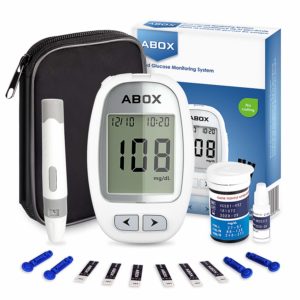
Click here for the lowest price on Amazon
The ABOX Glucose Meter is simple to use and has a big, easy to read screen on a light background. For older adults, that can be very helpful.
Why we like it: Among the glucose meters that are simple to use and have little in the way of advanced features, ABOX has one of the biggest and easiest to read screens. It also has an excellent on board data storage capacity: you can keep up to 900 glucose readings on the device.
Flaws: Like other simple and easy to use glucose meters, the ABOX Glucose Meter lacks modern features, so it’s hard to make good use of the on board memory storage.
8. iHealth Smart Wireless Glucose Meter
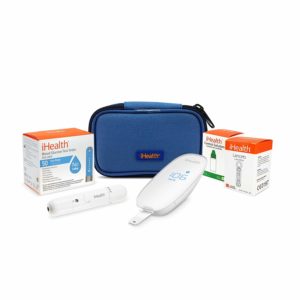
Click here for the lowest price on Amazon
If you want to track your blood sugar in a systematic and automated way, iHealth’s Wireless Glucose Meter is definitely worth a look. This glucose meter comes with Bluetooth connectivity, making it easy to transfer, store, and track your results via your smartphone.
Why we like it: If you are a data geek, or if you just want to monitor your blood glucose levels over the long term, wireless connectivity is a must. The ability to transfer results and store them in the cloud is a great new feature that is surprisingly lacking in many of the other competitors for the top spots on our rankings.
Flaws: iHealth Smart Wireless Glucose Meter suffers from some reliability problems, and the test strips have shorter shelf lives than the test strips that work with other glucose meters.
Also, the only way to store your numbers is on an account online with the company—that limits your options if you want to analyze your data in a more sophisticated way.
9. CareTouch Blood Glucose Monitoring System
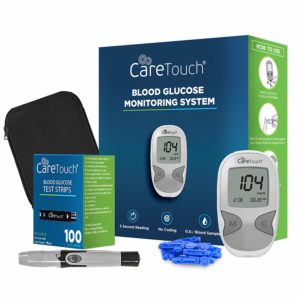
Click here for the lowest price on Amazon
CareTouch makes a pretty simple and straightforward glucose meter that’s got the same basic functionality you’ll see elsewhere in other simple models, with a large easy to use screen and no manual coding for test strips.
Why we like it: CareTouch is one more option when it comes to a glucose meter that is portable, easy to use, and requires no manual coding of test strips. The sterile ejection of used test strips is a nice perk that’s not seen on many other glucose meters.
Flaws: CareTouch doesn’t really do much to stand out from the crowd: its data storage memory (300) is mediocre compared to the competition, and it doesn’t support any data exporting.
10. Choice Wireless Blood Glucose Monitor
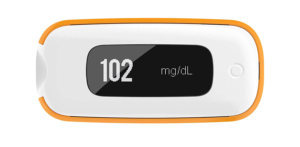
Click here for the lowest price on Amazon
If you want to know what the blood glucose meter of the future looks like, this is it. The slick, ultra-portable look of the Choice Wireless Blood Glucose Monitor is a nice break from traditional glucose meters that look straight out of the ‘80s. The wireless connection beams your blood sugar data straight to your smartphone.
Why we like it: When it comes to wireless glucose meters, this one is pretty good. It’s very hard to beat in the size department, too.
Flaws: Like other wireless models, connectivity is sometimes an issue, and the functionality of the app is mediocre at best. While this device is listed by several major health organizations, many users note that readings seem less accurate on this model compared to others. It seems like wireless functionality and accuracy are difficult to get working at the same time in the same device.
Who Needs Glucose Meters?
Glucose meters are commonly recommended for people who have either type 1 or type 2 diabetes. Type 1 diabetes is usually diagnosed fairly early in life, while type 2 diabetes develops later, though it can also be influenced by genetic factors alongside the more commonly known risk factors (physical inactivity, being overweight, and a diet high in refined carbohydrates and sugars).
For many people with diabetes, the biggest benefits of blood sugar monitoring using a glucose meter come from tracking your glucose levels over time. Doctors often recommend measuring your blood sugar several times a day; doing so can help you identify what makes you more likely to have abnormal blood sugar levels, and can help you see if your diabetes management plan is working long-term.
How We Ranked
When we formulated our rankings, the most important criteria was accuracy. We based our accuracy evaluations on independent lab testing from Consumer Reports, published scientific research, and the list of approved devices by the United States Food and Drug Administration (FDA)—according to research published in the Journal of Diabetes Science and Technology in 2015, devices that have been officially cleared by the FDA are significantly more likely to fall within their specified accuracy ranges during real-world use (1).
On top of accuracy, we also considered practical issues that affect your daily experience using a glucose meter. Size is first and foremost among these—a big, heavy, clunky device is a lot less convenient, which translates into a lower probability that you will test your blood sugar as often as you should.
Modern devices that offer features like Bluetooth connectivity and cloud-based storage of your glucose also scored well, as long as they were also accurate—while many users track their blood glucose the old fashioned way, using a pencil and paper, modern tracking can completely automate this process.
We made sure to include products that were both simple and easy to use as well as capable of more advanced features and functionality. Just like everyone’s diabetes treatment plan is different, so too will their needs when it comes to the features of a glucose meter.
Finally, after ranking by accuracy, features, and ease of use, we had our final list of the best glucose meters on the market. If you need to track your blood glucose on a regular basis, these devices are the best way to do it.
FAQs
Q: Are blood sugar and blood glucose the same thing?
A: Yes—“blood sugar” is a more colloquial term for blood glucose. Glucose is consumed by every cell in your body, and to sustain this energy consumption, your body shuttles glucose around in your bloodstream. Doctors and scientists usually specify that they are talking about glucose in the context of blood monitoring, but in conversation, especially with patients, the term “blood sugar” is used more often.
Q: How accurate are glucose meters?
A:All that’s required for a device to be certified from an accuracy standpoint are for it to measure within 15% of the true blood glucose value, at least 95% of the time. This potential imprecision points to the need to make sure you buy a high-quality glucose meter. Generally, even with a good glucose meter, a margin of error of 10% is quite likely. That means your measured blood glucose could be substantially higher or lower than the true value.
Q: Are there any glucose meters that don’t require blood?
A: Bloodless glucose meters are still an active area of research. One company had a device on the market that used an electric field to draw out glucose from your body without pricking your finger, but this device was withdrawn because it suffered from numerous problems: it didn’t work if you were sweating, it wasn’t very accurate, and the electric field damaged some peoples’ skin. Not good! Given the inconvenience of tracking blood glucose with strips, hopefully scientists will come up with a better solution.
Q: What is a continuous blood glucose meter?
A: A continuous glucose monitor is a device that is partially implanted into your skin. It broadcasts your blood glucose level wirelessly to a separate blood glucose meter. Continuous glucose meters might be the future of tracking blood sugar levels, but at the moment they are far less popular now than traditional test strip kits.
Q: Can you check blood sugar without pricking your finger?
A: Unfortunately, there are no FDA-approved devices on the market that offer the ability to check your blood glucose levels without pricking your finger. It’s an active area of research since finger pricks are inconvenient and test strips and lancets generate a lot of waste that needs to be disposed of.
Q: What are normal readings on a blood glucose meter?
A: Normal levels of blood glucose depend on the last time you’ve eaten. If you are fasting, you want glucose levels of 80 to 100 mg/dL. Fasting is defined as not having eaten any food for at least eight hours—most people only achieve this right when they wake up in the morning. After eating, levels of 170 to 200 are normal, but these should drop to 120-140 mg/dL within two or three hours (2). For type 2 diabetics, the more time you spend above these normal thresholds, the higher your risk of developing long-term complications of diabetes.
Q: What is the most accurate blood glucose meter?
A: Based on independent lab testing, the most accurate blood glucose meters on the market right now are the FreeStyle Freedom Lite and Bayer Contour Next. These devices offer multiple advanced features that make them great choices as a glucose meter, but their industry-leading accuracy is certainly their best perk.
Q: Can you buy a glucose meter over the counter?
A: Yes, you can buy all of the necessary supplies for at home glucose monitoring over the counter: a glucose meter, test strips, a lancing device, and sterile lancets. Your doctor might have specific guidelines on the type of device you should get, or more importantly, the frequency with which you should test and record your blood glucose.
Q: How do you use a glucose meter?
Before measuring your blood glucose levels, make sure you wash your hands and dry them well—residue from dirt, oils, sweat, or lotion on your hands can interfere with the functioning of your test strips and glucose meter. Once you’ve put in a new test strip and turned on your glucose meter, use a fresh, sterile lancet to prick your finger and squeeze a drop of blood onto your test strip. Wait to get your results. Then, be sure to record your glucose level, either manually or using the wireless connectivity on your glucose meter.
Q: How can you check the accuracy of a glucose meter?
A: To check the accuracy of a glucose meter, you need a standard to compare it to. Fortunately, when you go to the doctor’s office for a regular appointment, you can check your blood glucose level using your glucose meter right before you have your blood drawn for lab tests. That way, you can compare your meter’s reading to the lab’s reading, which will have been tested at more or less the same time. When you compare the results, make sure you’re looking at the same units as labs may report blood glucose in mmol/L or mg/dL..
Recap
If you have diabetes or any other medical condition that affects your ability to regulate your blood sugar, tracking your blood glucose levels with a glucose meter is the best way to guide your overall management strategy.
For cpoe.org’s #1 glucose meter recommendation, click here.

